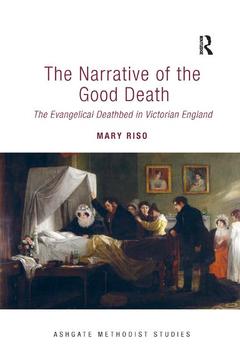The Narrative of the Good Death The Evangelical Deathbed in Victorian England Routledge Methodist Studies Series
Auteur : Riso Mary

Preface; 1. The cultural landscape of evangelical nonconformist death; 2. Obituaries as literature: form and content; 3. Evangelical nonconformist theology and deathbed piety; 4. The claims of heaven and earth: social background and social mobility; 5. The old dissent and the new dissent: denominational variations; 6. The infinite in the finite: the romantic spirit and nonconformist death; 7. Last words: the experience of death; 8. The good death and a good life; Appendices
Date de parution : 03-2017
15.6x23.4 cm
Date de parution : 09-2015
15.6x23.4 cm
Thème de The Narrative of the Good Death :
Mots-clés :
obituary; author; evangelical; nonconformist; denominational; magazines; primitive; methodist; wesleyan; magazine; Evangelical Nonconformist; Obituary Author; Wesleyan Methodist Magazine; Wesleyan Methodist; Four-fold Formula; Denominational Magazines; James Street; Laborare Est Orare; Ars Moriendi; Evangelical Nonconformity; Death Narrative; Primitive Methodist; Obituary Subjects; Primitive Methodist Magazine; Methodist Magazine; Good Death; Romantic Spirit; Middle Class Respectability; Evangelical Revival; Denominational Variations; Obituary Analysis; Evangelical Magazine; Holy Man; Good Life; Entire Sanctification



